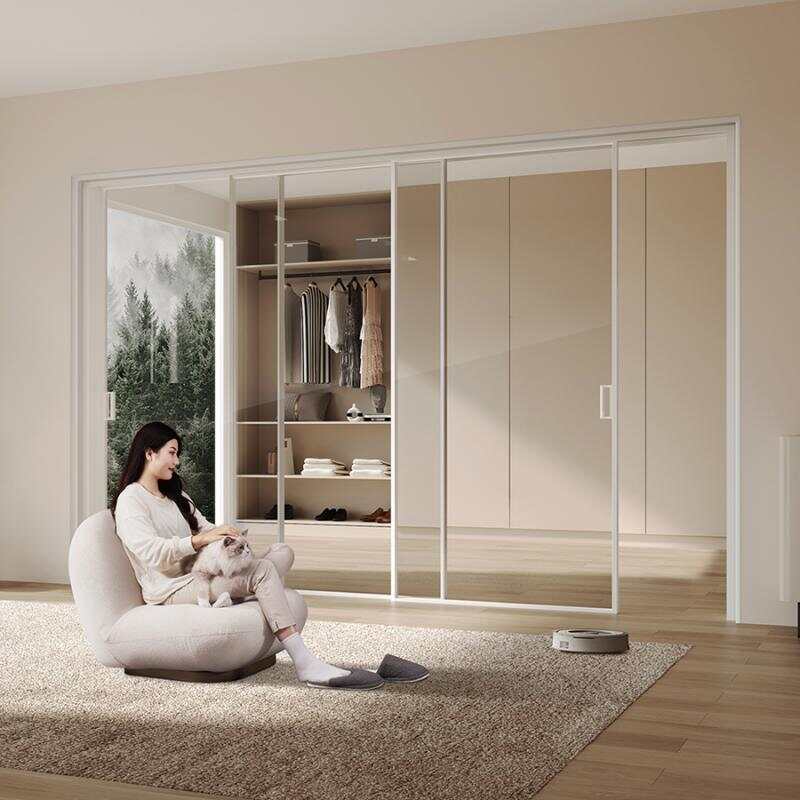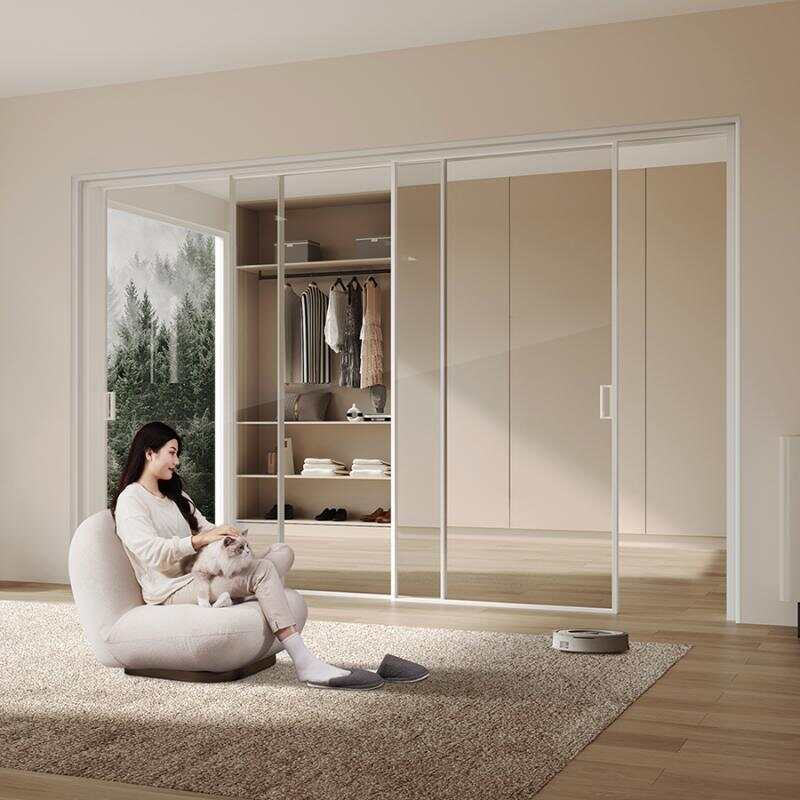Email format error
Email cannot be empty
Email already exists
6-20 characters(letters plus numbers only)
The password is inconsistent
Email format error
Email cannot be empty
Email does not exist
6-20 characters(letters plus numbers only)
The password is inconsistent


The Science Behind Sliding Aluminum Doors
Sliding aluminum doors are not just a stylish choice for modern homes and businesses; they embody a blend of science, engineering, and design. In this article, we’ll delve into why aluminum is a preferred material for these doors, explore the engineering challenges faced by manufacturers, and compare sliding aluminum doors to other types. By the end, you'll have a thorough understanding of what makes sliding aluminum doors a standout option in today’s architectural landscape.
Material Properties of Aluminum
Why Aluminum is Chosen for Sliding Doors
Strength and Durability
One of the primary reasons aluminum is chosen for sliding doors is its exceptional strength-to-weight ratio. Aluminum is a lightweight metal, yet it offers impressive strength. This makes it an ideal material for doors that need to support large glass panels without becoming unwieldy. The strength of aluminum ensures that the door frames can withstand daily use, including the pressure from opening and closing, without warping or bending.
Moreover, aluminum’s durability extends its lifespan. Unlike some materials, aluminum doesn’t easily succumb to damage from regular wear and tear. It retains its structural integrity over time, making it a reliable choice for both residential and commercial applications.
Resistance to the Elements
Another significant advantage of aluminum is its natural resistance to the elements. Aluminum does not rust or corrode like steel or iron, which makes it well-suited for doors exposed to various weather conditions. This corrosion resistance is particularly beneficial in coastal areas where saltwater can accelerate the deterioration of other materials.
Aluminum also performs well in extreme temperatures. Whether in scorching summer heat or freezing winter cold, aluminum sliding doors maintain their functionality and appearance. This resilience to temperature fluctuations ensures that the doors continue to operate smoothly and retain their aesthetic appeal over time.
Maintenance Benefits
Aluminum doors are known for their low maintenance requirements. Unlike wood, which needs regular painting or sealing to protect against moisture, aluminum doors can be easily cleaned with a simple wipe-down. Their surface treatment, such as anodizing or powder coating, enhances their resistance to dirt and grime, making upkeep straightforward and cost-effective.
Engineering Challenges in Sliding Aluminum Door Design
Weight Distribution
One of the critical engineering challenges in designing sliding aluminum doors is managing weight distribution. Despite aluminum's lightweight properties, the doors often incorporate large glass panels, which can make them heavy. Proper weight distribution is essential to ensure that the door slides smoothly and does not put undue stress on the tracks and rollers.
To address this, engineers use specialized tracks and roller systems designed to support the weight of the door evenly. Precision in manufacturing is crucial, as any misalignment can lead to operational issues. Advanced technology in extrusion and machining helps create tracks and rollers that distribute weight effectively, ensuring smooth and reliable performance.
Weather Resistance
Designing sliding aluminum doors to withstand various weather conditions involves addressing several factors. One key consideration is thermal insulation. While aluminum itself is a good conductor of heat, modern sliding aluminum doors often feature double or triple glazing, which improves insulation and energy efficiency. These insulating glass units help maintain indoor temperatures, reducing the need for heating or cooling and contributing to energy savings.
Weather seals and gaskets are also integral to the design. They prevent drafts, water ingress, and dust from entering the interior. These seals are strategically placed around the door frame and along the edges of the glass panels. Proper installation and regular maintenance of these seals are crucial for ensuring the door’s effectiveness in keeping out the elements.
Structural Integrity
Maintaining structural integrity is another challenge, especially when dealing with large glass panels. Aluminum frames need to be reinforced to support the weight of the glass and resist any pressure or impact. Engineers use various techniques, including reinforced profiles and cross-sectional designs, to enhance the strength of the frames.
Innovations in aluminum extrusion technology have significantly improved the ability to produce strong, lightweight frames. This technology allows for precise control over the thickness and strength of the aluminum profiles, ensuring that they meet the structural requirements for sliding doors.
Comparing Sliding Aluminum Doors to Other Types of Doors
Material Comparison
Wood
Wood has long been a popular choice for doors due to its natural beauty and versatility. However, when compared to aluminum, wood has some drawbacks. Wood doors are susceptible to rot, warping, and expansion due to moisture. They require regular maintenance, including painting or sealing, to protect against the elements. In contrast, aluminum’s resistance to moisture and its low maintenance requirements make it a more durable and hassle-free option.
Fiberglass
Fiberglass doors are known for their durability and insulating properties. They are resistant to dents, scratches, and corrosion, which makes them a viable alternative to aluminum. However, fiberglass doors can be more expensive than aluminum doors, and their aesthetics may not always match the sleek, modern look that aluminum provides. Additionally, fiberglass doors may require more complex installation processes compared to aluminum.
Steel
Steel doors offer exceptional strength and security, making them a good choice for high-security applications. However, steel is prone to rust and corrosion, especially if not properly coated or maintained. While steel doors can be durable, they often require more upkeep than aluminum doors. Additionally, steel doors can be heavier and more cumbersome to operate compared to aluminum sliding doors.
Functionality and Aesthetics
Sliding vs. Hinged Doors
Sliding doors offer significant advantages over hinged doors, particularly in terms of space efficiency. Hinged doors require space to swing open, which can be problematic in tight areas or rooms with limited clearance. Sliding doors, on the other hand, move along a track and do not require additional space for operation. This makes them ideal for areas where maximizing usable space is important.
In terms of aesthetics, sliding doors provide a sleek, modern look with their clean lines and large glass panels. They create a sense of openness and can seamlessly connect indoor and outdoor spaces. Hinged doors, while classic and functional, may not offer the same level of visual continuity and space-saving benefits.
Sliding vs. Bi-Fold Doors
Bi-fold doors, also known as accordion doors, consist of multiple panels that fold together when opened. They are a good option for wide openings, providing a full-width access point when fully opened. However, bi-fold doors require additional space for the panels to fold and stack, which can limit their suitability in certain configurations.
Sliding doors, in contrast, remain more streamlined when opened, as they slide along a track and do not require extra space for the panels. This makes them a better choice for areas where maintaining a clean, unobstructed passage is important. Additionally, sliding doors offer more flexibility in terms of customization and design, allowing for larger glass panels and a more modern appearance.
Conclusion
Sliding aluminum doors represent a blend of scientific innovation and practical design. Their material properties—strength, durability, and resistance to the elements—make them a popular choice for modern architectural applications. The engineering challenges of weight distribution, weather resistance, and structural integrity are addressed through advanced manufacturing techniques and design solutions.
When compared to other types of doors, sliding aluminum doors offer distinct advantages in terms of functionality, aesthetics, and maintenance. Whether you’re considering them for a residential or commercial space, sliding aluminum doors provide a sleek, practical solution that enhances both the design and performance of your environment.
As technology and design continue to evolve, sliding aluminum door factories will likely introduce even more innovations, further solidifying aluminum’s role as a leading material in modern door systems.

